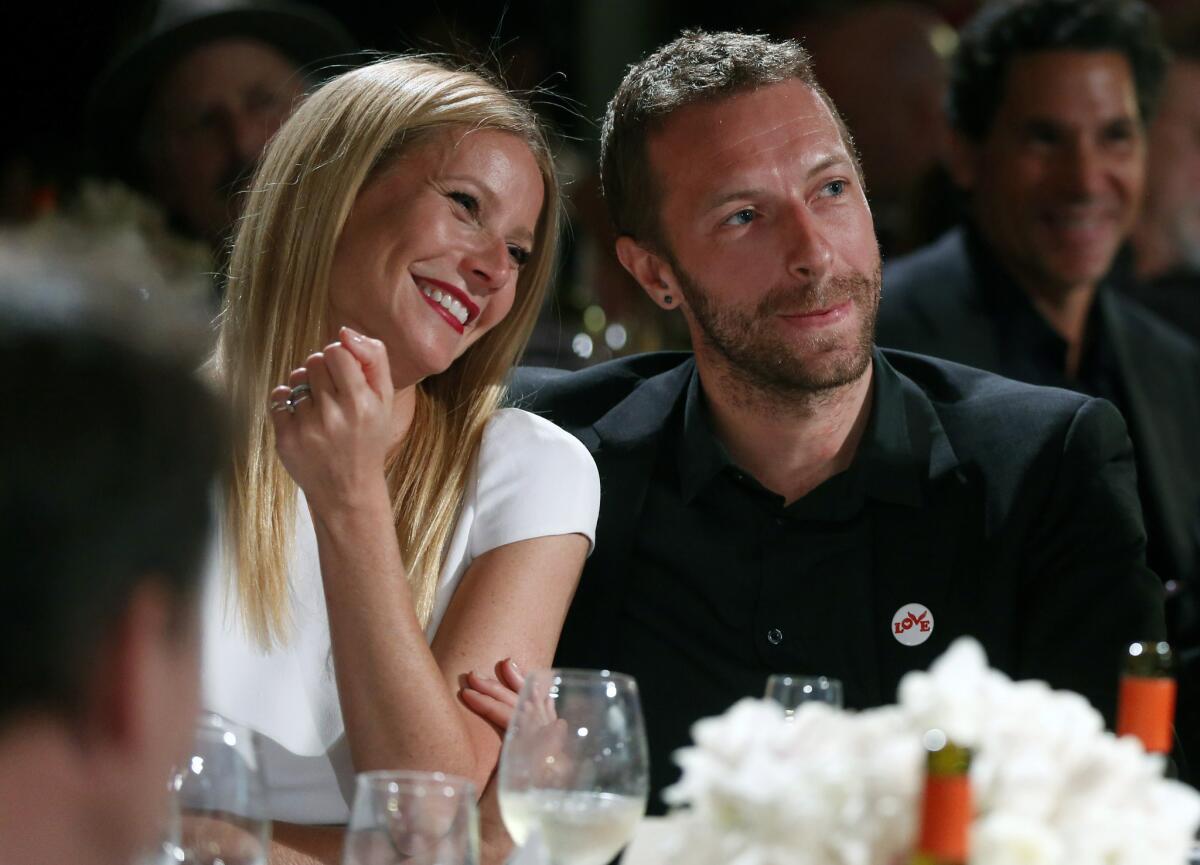The bogus science behind Paltrow and Martin’s ‘conscious uncoupling’

- Share via
No matter how you spin it, divorce is a failure.
It’s a failure of intention.
A failure of commitment.
A failure of the very thing you promised to do when you wed, which is stay together for the rest of your life.
But hey, Gwyneth Paltrow and Chris Martin, if it makes you feel better to torture the language, have at it: Call your divorce after 11 years of marriage a “conscious uncoupling.”
It’s still a failure.
Sure, it’s easy to mock Paltrow and Martin (but mostly Paltrow) for using that phrase to describe their split on her icky lifestyle website, Goop. Good for them for keeping a lid on the story (more or less) until they were ready to announce it in their own sweet time. Kudos, as well, to Slate for already being on the case with its relationship widget. (Plug in your name and your romantic status to get the Goopified version of yourself. Me? I’m “harmoniously departnered.”)
But once I read the long essay beneath the Paltrow/Martin announcement on Goop -- a treatise on the meaning of “conscious uncoupling” -- it became quite clear that Paltrow and Martin should simply have made their announcement and stopped explaining. By trying to elevate a marital split into something cosmically important, they are making one of the most serious moments of their lives -- and certainly a terrible moment for their two children -- into something laughable.
“Conscious uncoupling” is psychobabble for people who can’t say D-I-V-O-R-C-E.
Goop’s “conscious uncoupling” essay is unintentionally hilarious and scientifically bogus. Written by husband-and-wife team Drs. Habib Sadeghi and Sherry Sami, it purports to explain why human beings aren’t built to stay in love. Sadeghi is an integrative medicine specialist; Sami is a pediatric orthodontist. I’m sure they are lovely, well-meaning people. And probably even good at what they do.
But an explanation of someone’s divorce that begins, “During the upper Paleolithic period of human history (roughly 50,000BC to 10,000BC) the average human life expectancy at birth was 33” is going to be an exercise in fatuous logic.
And indeed, Sadeghi and Sami do not disappoint: “By 1900,” they continue, “U.S. life expectancy was only 46 for men, and 48 for women. Today, it’s 76 and 81 respectively. During the 52,000 years between our Paleolithic ancestors and the dawn of the 20th Century, life expectancy rose just 15 years. In the last 114 years, it increased by 43 years for men, and 48 years for women.”
You know where this is going, right? You know it’s going to be an attempt to rationalize the failed marriage of a rock star and a movie star who apparently don’t have it in them to admit: Hey, we screwed it up.
“What does this have to do with divorce rates?” Sadeghi and Sami ask. “For the vast majority of history, humans lived relatively short lives -- and accordingly, they weren’t in relationships with the same person for 25 to 50 years…. To put it plainly, as divorce rates indicate, human beings haven’t been able to fully adapt to our skyrocketing life expectancy. Our biology and psychology aren’t set up to be with one person for four, five, or six decades.”
Nice try, doctors.
According to the U.S. Census Bureau, marriages are most susceptible to divorce in the early years, not later on.The divorce rate slows after 10 years of marriage.
And anyway, do we really need some fake sociobiology to explain to us why it’s hard to stay faithful? Or why beautiful celebrity couples accustomed to having their every demand not only met but eagerly anticipated by those around them have such trouble staying married?
If stardom means anything in this culture, it means never having to say no to your impulses.
While marriage, as anyone who has been there knows, is all about compromise.
Life expectancy has nothing to do with it.
robin.abcarian@latimes.com
Twitter: @robinabcarian







